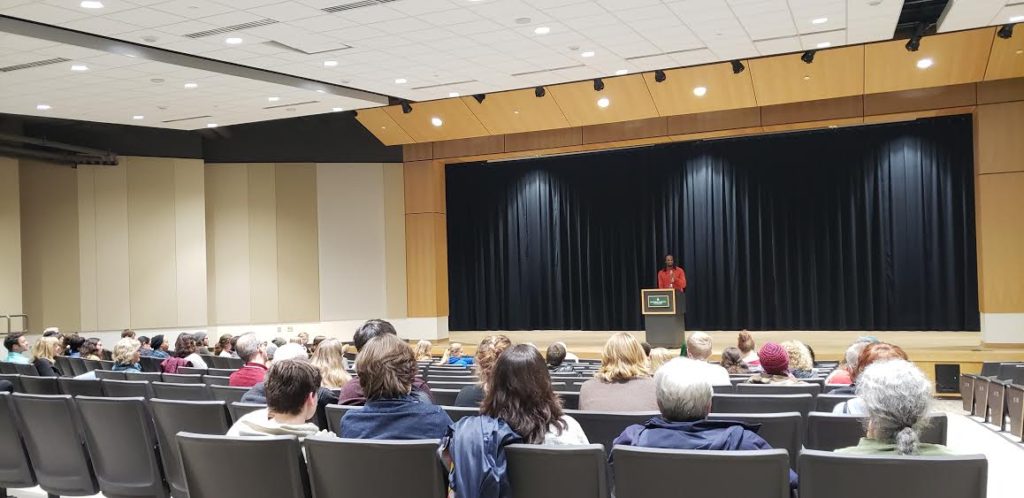A half hour before he was slated to read poetry and answer audience questions in Jamrich 1100 on Thursday, Oct. 17, Jericho Brown took slow, meandering steps through the rows of chairs before sitting down at one and taking a deep breath, perhaps gathering himself. No one waiting outside the auditorium to see him speak seemed to notice he was there.
At 7 p.m., Brown stepped behind the podium after brief introductions from the director of the visiting writer series and a graduate student in the English department. The audience went quiet the moment he settled at the microphone and cleared his throat before diving into the poems from his new book, “The Tradition.”
Brown opened with the first poem in the book, “Ganymede,” a poem that uses elements of mythology and love to defy simple explanation. After finishing the final line, there was a brief moment of silence before junior English major Megan McKay leaned to a friend and said, “I didn’t breathe that whole time.”
Brown’s latest book is a finalist for the 2019 National Book Award in poetry. His previous two books have won awards, and he has been awarded a Guggenheim Fellowship and a National Endowment for the Arts in poetry, amongst other prestigious awards.
A trend of breathless silence continued throughout the reading, but Brown lightened the mood when the questions and answer portion began. He talked multiple times about approaching writing fearlessly.
“You have to play. You’re willing to fail because you don’t think failure is a possibility,” Brown said. “Just because a line doesn’t work today doesn’t mean it won’t work tomorrow—you’ve got to be a poet the rest of your life.”
Brown never throws away anything he writes. Lines from his latest book were written years before, some as early as 1999.
A lot of the poems in this book were written with old lines that he found a purpose for, he said.
The questions all steered towards his writing process and advice he would give to young writers. Read what interests you, he said. Along with that, he instilled hope that anyone can write if they want to.
“Where you are is not what’s going to make you a poet. You can be anywhere and you still have to do the work—you still have to read and you still have to write your heart out,” he said. “My poems are the best representation of my soul on earth.”
Brown ended the night by signing books. He took the time to have a brief conversation with each buyer, and most people exited the auditorium with a smile.
McKay was one of those people who noted that this was the first poetry reading she ever attended.
“I think he was a really good speaker,” Mckay said. “The pacing of his poems was fantastic and his presence was very good.”
She also complimented the organization of the event, which started right on time, as well as the introduction he was given, saying a really good overall tone was set.
“Every poem made me gasp. He took my breath away, honestly,” she said.

























